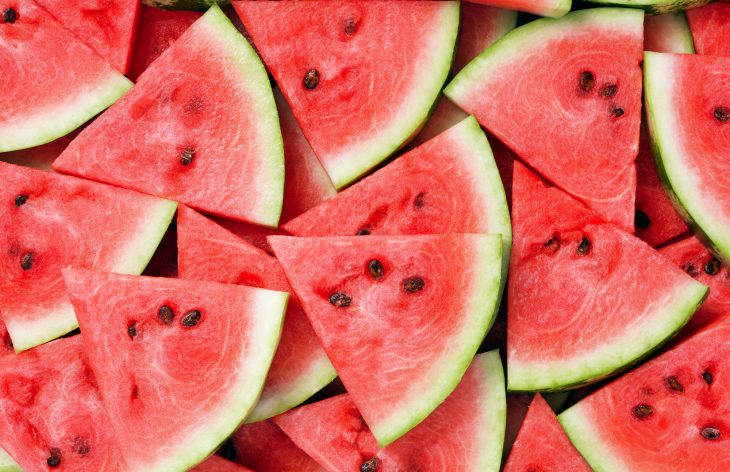
Summer is the perfect season for treating yourself to a delicious, juicy slice of watermelon. This sweet and refreshing treat is packed with lots of amazing health benefits! That’s right: watermelons aren’t just tasty – they actually have some impressive nutritional value too. We’ve put together 28 important nutrition facts you should know about watermelons if you want to make sure you get the most out of this summer delight! From vitamins and minerals, to beneficial compounds, discover all that watermelons have to offer in this comprehensive guide.
A Hydration Powerhouse
Watermelon is about 92% water. It’s an excellent fruit to stay hydrated, particularly during the hot summer months.
Low in Calories
Despite its sweet taste, watermelon is relatively low in calories. A cup of diced watermelon contains only around 46 calories, making it a guilt-free sweet treat.
Packed with Vitamins
Watermelon is a good source of vitamins A and C. Vitamin A is essential for good vision, while Vitamin C is vital for skin health and immunity.
Rich in Antioxidants
Watermelon contains several potent antioxidants, including lycopene and Vitamin C. Antioxidants help protect your cells from harmful free radicals.
Low in Fat
Watermelon is virtually fat-free. This makes it an ideal choice for those looking to maintain a healthy weight or diet.
High in Fiber
The fiber content in watermelon contributes to a feeling of fullness and can aid in digestion.
Good Source of Potassium
Potassium is an essential mineral that helps regulate blood pressure and maintain nerve function. A cup of watermelon offers approximately 5% of the daily recommended intake.

Contains Magnesium
Watermelon provides about 4% of the daily recommended intake of magnesium per cup. This mineral plays a vital role in muscle function, bone health, and more.
Packed with B Vitamins
Watermelon contains B vitamins like B1 (thiamine) and B6 (pyridoxine), which help your body convert food into energy.
Contains Folate
Watermelon is a good source of folate, a B-vitamin that helps with the production and maintenance of new cells.
Contains Choline
Watermelon is a source of choline, a nutrient that aids in sleep, muscle movement, and memory.
Improves Cardiovascular Health
The lycopene in watermelon may help lower cholesterol and blood pressure. This makes watermelon a heart-friendly food.
Eye Health Promoter
Watermelon contains lutein and zeaxanthin, two compounds that are beneficial for our eyes. They help protect against age-related eye disorders.
Improve Digestion
Thanks to its high water and fiber content, watermelon can help promote healthy digestion.

A Natural Diuretic
Watermelon’s high water content also makes it a natural diuretic. This can help increase urine production and assist in kidney cleansing.
May Aid Muscle Soreness
Watermelon juice has been found to reduce muscle soreness in athletes, thanks to a naturally occurring amino acid called L-citrulline.
Supports Skin Health
Watermelon is rich in vitamins A and C, both crucial for skin health. Vitamin C helps your body produce collagen, a protein that keeps your skin supple, while vitamin A repairs skin cells.
May Aid Weight Loss
Being low in calories and high in water, watermelon can help control hunger and promote a feeling of fullness.
Anti-Inflammatory Properties
The lycopene and vitamin C in watermelon have been linked to anti-inflammatory effects, which could be beneficial in managing chronic diseases like heart disease and cancer.
Boosts Immune System
The vitamin C in watermelon can strengthen your immune system and help your body fight off illnesses.
Supports Bone Health
The lycopene present in watermelon has been linked with better bone health and a lower risk of osteoporosis.

May Lower Insulin Resistance
Watermelon has been found to reduce insulin resistance in some studies, potentially making it a good fruit choice for people with diabetes
Boosts Mood
The vitamins B6 and C in watermelon may help improve mood.
May Help with Asthma Prevention
The vitamin C in watermelon may help with asthma prevention.
Good for Pregnant Women
Watermelon eases heartburn, a common condition in pregnancy, and reduces swelling due to its high water content.
Relieve Morning Sickness
Watermelon can provide relief from morning sickness during pregnancy.
Help Prevent Cell Damage
The antioxidant lycopene in watermelon helps to prevent cell damage.
Improve Hair Health
Vitamin C in watermelon aids in the body’s production of collagen, a protein that makes hair strong.
Conclusion
Watermelons truly are an amazing treat to enjoy during the summer months. With all the vitamins, minerals, and beneficial compounds they contain, there’s no question that these fruits should be included in your diet. Eating watermelon can improve both your overall health and your energy levels, and it makes for a delicious snack too! We hope this guide has given you a comprehensive introduction to what makes watermelons such an incredible fruit. It’s true – there really is something special about watermelons that make them so irresistible! So go ahead, and indulge in this summer favorite – we promise you won’t be sorry. You know what they say: when life gives you watermelon, make sure you take advantage of all its benefits!
Was this page helpful?
Our commitment to delivering trustworthy and engaging content is at the heart of what we do. Each fact on our site is contributed by real users like you, bringing a wealth of diverse insights and information. To ensure the highest standards of accuracy and reliability, our dedicated editors meticulously review each submission. This process guarantees that the facts we share are not only fascinating but also credible. Trust in our commitment to quality and authenticity as you explore and learn with us.
